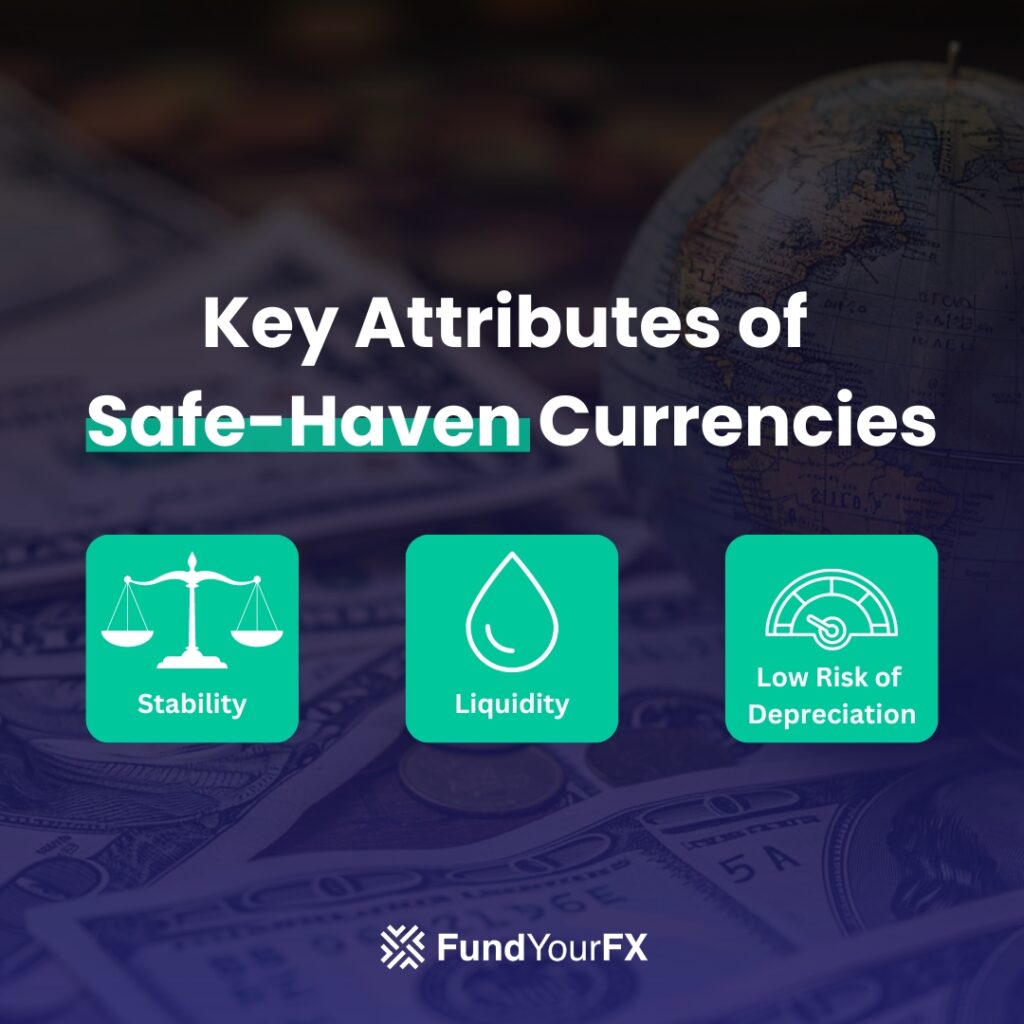Introduction to Safe Haven Currencies
Geopolitical tensions often cause economic uncertainty and market volatility. During such times, investors seek stability through safe-haven currencies to protect their assets. These currencies, known for their resilience, become crucial in maintaining value when traditional investments may falter.
Safe-haven currencies are vital for investors looking to weather uncertain times. They offer a refuge from the unpredictability of markets influenced by geopolitical events. Understanding the dynamics of these currencies and their importance in investment strategies is essential for making informed decisions during crises.
This blog post will explore the top currencies to consider during geopolitical tensions, discussing their stability, the factors contributing to their safe-haven status, and effective investment strategies to mitigate risks and preserve wealth. By examining safe-haven currencies, investors can better manage economic uncertainties and protect their investments. For more insights into market behavior during turbulent times, check out our analysis of major forex market movements.
The Role of Safe-Haven Currencies in Geopolitical Turmoil

During periods of geopolitical unrest, certain currencies are favored by investors for their stability and reliability. These safe-haven currencies are characterized by attributes that make them less susceptible to the risks associated with economic and political turbulence.
Stability is one of the most critical features of a safe-haven currency. Countries that issue these currencies typically have strong economic fundamentals, such as low inflation rates, high levels of foreign reserves, and sound fiscal policies. This economic strength reassures investors that their assets will retain value even when global markets are in turmoil.
Liquidity is another essential characteristic. Safe-haven currencies are widely traded and easily convertible into other assets, providing investors with the flexibility to quickly move their funds without significant loss in value. This high liquidity ensures that there is always a market for these currencies, further enhancing their appeal during crises.
A low risk of depreciation is also crucial. Safe-haven currencies tend to be issued by countries with stable political environments and robust legal systems, reducing the likelihood of sudden devaluations. This reliability in value preservation is a key factor in why investors turn to these currencies during uncertain times.
These attributes align with investor preferences for risk management. By holding safe-haven currencies, investors can hedge against the volatility and uncertainty that often accompany geopolitical tensions. The ability to preserve capital and maintain purchasing power in such conditions makes these currencies a strategic choice for those looking to safeguard their investments.
US Dollar: The Ultimate Safe-Haven
The US Dollar (USD) stands out as the ultimate safe-haven currency, favored by investors worldwide during times of geopolitical turmoil. Several key attributes make the USD a preferred choice for safeguarding assets.
Economic Size: The United States has the largest economy in the world, providing a strong foundation for the USD. This economic might instills confidence in investors, knowing that the USD is backed by a robust and diverse economy capable of weathering global shocks.
Liquidity: The USD is the most widely traded currency globally, offering unmatched liquidity. This means that investors can easily buy and sell USD-denominated assets without significantly impacting their value. High liquidity ensures that the USD remains a reliable medium of exchange, even during periods of market stress.
Investor Trust: Trust in the USD is reinforced by the stability of the US political system and the strength of its financial institutions. The US government and Federal Reserve have a long history of implementing policies that maintain the currency’s value, further boosting investor confidence. This trust is reflected in the USD’s status as the world’s primary reserve currency, held by central banks around the globe.
USD-Denominated Assets: Many global commodities, such as oil and gold, are priced in USD, which adds to its attractiveness as a safe haven. Holding USD allows investors to participate in these markets more seamlessly. Additionally, US Treasury bonds are considered some of the safest investments, providing a secure place for investors to park their money during uncertain times.
Swiss Franc: Stability Amidst Uncertainty
The Swiss Franc (CHF) is renowned for its stability and reliability, making it a favored safe-haven currency during geopolitical tensions. Several factors contribute to its strong appeal among investors.
Political Neutrality: Switzerland’s long-standing policy of political neutrality is a cornerstone of its appeal. By staying neutral in international conflicts, Switzerland maintains a stable and predictable political environment, which reassures investors seeking refuge from global uncertainties.
Banking Stability: The Swiss banking system is one of the most secure and reliable in the world. Swiss banks are known for their stringent regulations, robust financial practices, and strong capital reserves. This reputation for banking stability attracts investors looking for a safe place to store their assets during turbulent times.
Currency Reliability: The Swiss Franc is backed by a sound economic foundation and prudent financial policies. Switzerland’s low inflation rate, balanced budget, and conservative monetary policy contribute to the CHF’s reputation as a reliable store of value. Investors trust that the CHF will maintain its value, even when other currencies are experiencing volatility.
Switzerland’s financial policies further enhance the appeal of the Swiss Franc. The Swiss National Bank (SNB) is committed to maintaining price stability and implementing policies that support the strength and reliability of the CHF. This commitment ensures that the Swiss Franc remains a dependable currency during periods of geopolitical unrest.
Japanese Yen: A Reliable Refuge
The Japanese Yen (JPY) is widely regarded as a reliable safe-haven currency, especially during times of geopolitical tension. Several factors contribute to its status as a refuge for investors.
Net Creditor Nation: Japan is one of the world’s largest net creditor nations, meaning it holds more foreign assets than it owes to other countries. This strong financial position instills confidence in the stability of the Japanese economy and, by extension, the Yen. Investors view the JPY as a dependable currency that can preserve value during crises.
Current Account Surplus: Japan consistently runs a current account surplus, indicating that the country exports more goods and services than it imports. This surplus is a sign of economic strength and stability, further enhancing the attractiveness of the Yen as a safe-haven currency. A robust current account surplus suggests that Japan has a steady inflow of foreign currency, bolstering the Yen’s value.
Fund Repatriation: During periods of global uncertainty, Japanese investors often repatriate funds back to Japan, strengthening the Yen. This behavior is driven by the desire to protect assets by bringing them back to a stable and familiar environment. The resulting demand for the Yen increases its value, making it a reliable refuge during market turbulence.
Economic Surplus: Japan’s consistent economic surplus also plays a crucial role in the Yen’s safe-haven status. The surplus provides a cushion against economic shocks and ensures that Japan can manage its debt effectively. This economic resilience is a key factor in why investors trust the Yen during times of global uncertainty.
Euro: A Surprising Safe-Haven
The Euro (EUR) has emerged as a surprising safe-haven currency, gaining traction among investors during geopolitical tensions. Several factors contribute to its appeal and stability.
Eurozone Stability: The Eurozone is composed of several strong economies, including Germany, France, and the Netherlands. The combined economic strength of these nations provides a solid foundation for the Euro. Despite occasional political and economic challenges, the Eurozone has demonstrated resilience, fostering investor confidence in the Euro’s stability.
Global Trade: The Euro plays a significant role in global trade. As the second most widely held reserve currency after the US Dollar, the Euro is used extensively in international transactions. This widespread use underscores its importance in the global economy and adds to its appeal as a safe-haven currency. Investors trust that the Euro will remain a stable and valuable currency amid global uncertainties.
Economic Stability: The Eurozone’s commitment to economic stability is evident in its stringent fiscal policies and coordinated monetary policies managed by the European Central Bank (ECB). The ECB’s proactive measures to maintain price stability and manage inflation contribute to the Euro’s reliability. The Eurozone’s strong regulatory framework and economic policies further enhance the Euro’s appeal to investors seeking stability.
Trade Relations: The Eurozone’s extensive trade relations with other major economies reinforce the Euro’s stability. Strong trade ties with countries like the United States and China ensure a steady demand for the Euro, supporting its value even during geopolitical upheavals. These trade relationships contribute to the Euro’s resilience and its role as a safe-haven currency.
Exploring Gold-Backed Currencies
Gold-backed currencies offer a unique form of financial security during times of crisis. These currencies are supported by gold reserves, providing a tangible asset that enhances their stability and appeal. In this section, we will explore the benefits and examples of gold-backed currencies and their role during geopolitical tensions.
Asset Backing
Gold-backed currencies are tied to physical gold reserves, which act as a guarantee of value. This backing provides an extra layer of security for investors, as the currency’s worth is directly linked to a tangible asset. In times of crisis, when confidence in fiat currencies may waver, gold-backed currencies offer a reliable alternative.
Gold Standard
The concept of gold-backed currencies is rooted in the gold standard, a monetary system where a country’s currency or paper money has a value directly linked to gold. Although the traditional gold standard is no longer in widespread use, some countries and financial systems still maintain reserves that back their currencies. This practice reassures investors that the currency will retain its value even during economic downturns.
Financial Security
Gold has historically been a safe-haven asset, valued for its ability to preserve wealth over time. Currencies backed by gold inherit this stability, making them an attractive option for investors looking to protect their assets during geopolitical tensions. The intrinsic value of gold helps to mitigate the risks associated with currency devaluation and inflation.
Examples of Gold-Backed Currencies
While fully gold-backed currencies are rare in the modern financial system, some examples include digital gold-backed currencies and certain national currencies that maintain significant gold reserves. These currencies leverage the stability and historical reliability of gold to offer enhanced security to investors.
Benefits of Gold-Backed Currencies
The primary benefit of gold-backed currencies is their ability to maintain value during times of economic uncertainty. They provide a hedge against inflation and currency depreciation, offering a secure investment option when traditional currencies might falter. Additionally, the finite supply of gold ensures that these currencies are less susceptible to the fluctuations that can affect fiat currencies.
Gold-backed currencies play a crucial role in providing financial security during geopolitical crises. Their asset backing, rooted in the principles of the gold standard, and their inherent stability make them a valuable option for investors seeking to safeguard their wealth. By understanding the benefits and examples of gold-backed currencies, investors can better navigate periods of economic uncertainty and ensure the stability of their investments.
Conclusion
Safe-haven currencies are essential for protecting wealth during geopolitical crises. By choosing and investing in these stable currencies, such as the US Dollar, Swiss Franc, Japanese Yen, and gold-backed currencies, investors can safeguard their assets against market volatility.
Investing in safe-haven currencies requires a thoughtful strategy. This includes diversifying your portfolio, staying informed about global events, and being ready to adjust your investments as needed. A well-planned approach helps mitigate risks and ensures financial security.
Incorporating safe-haven currencies into your overall financial plan is crucial. This involves assessing your risk tolerance, setting clear investment goals, and maintaining a balanced portfolio. By doing so, you can achieve a more stable and resilient financial future.
In summary, safe-haven currencies provide stability and protection in uncertain times. Through strategic investment and careful financial planning, you can navigate market challenges and secure long-term financial success. For additional tips on effective trading strategies, visit our guide on how to apply fundamental strategies and trading strategies for volatile markets.







